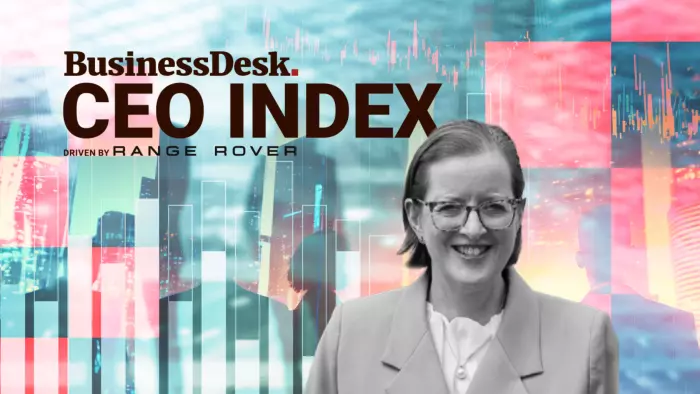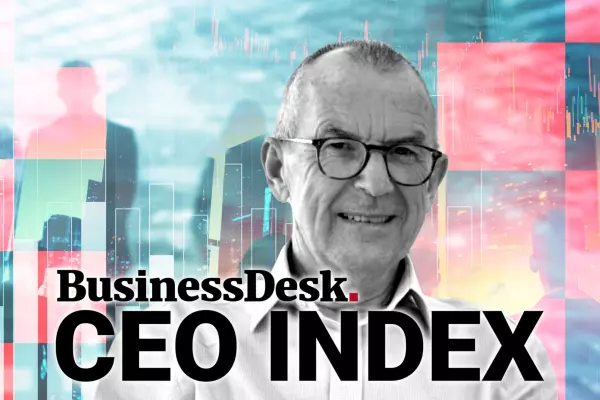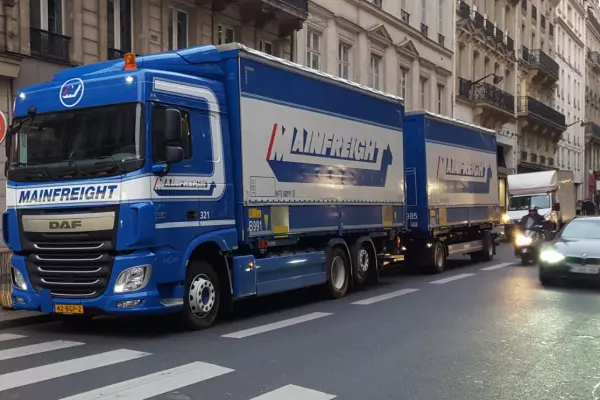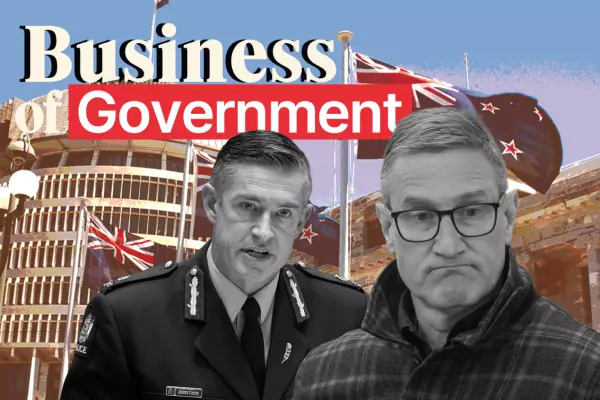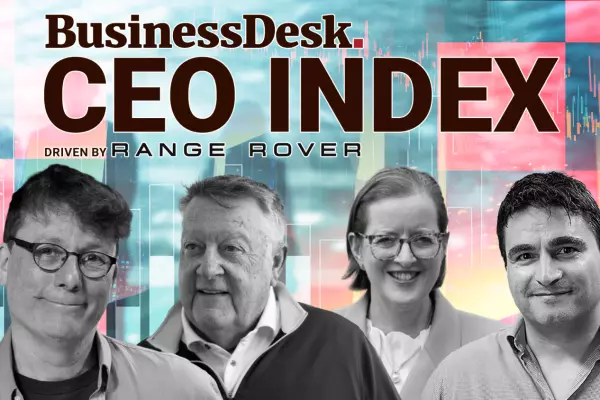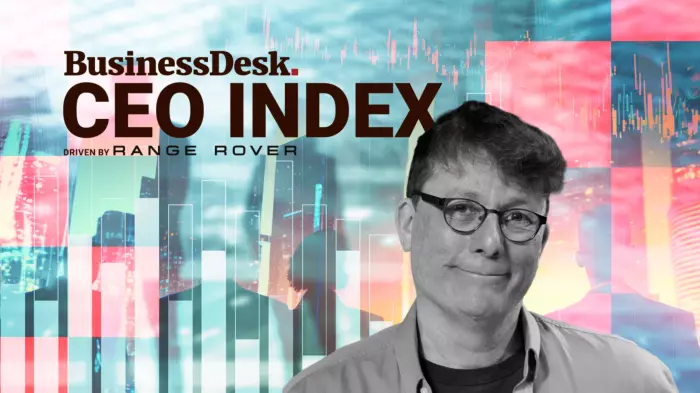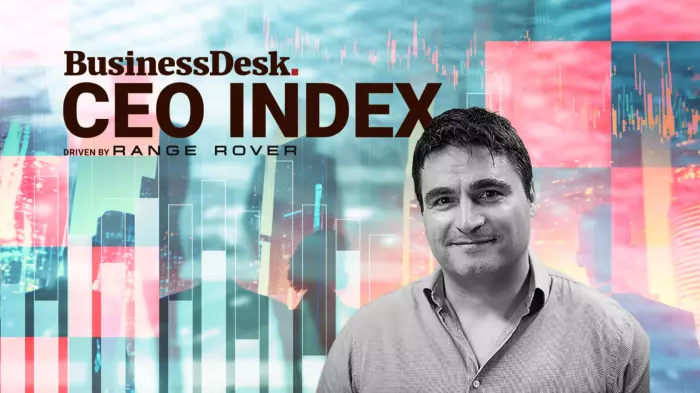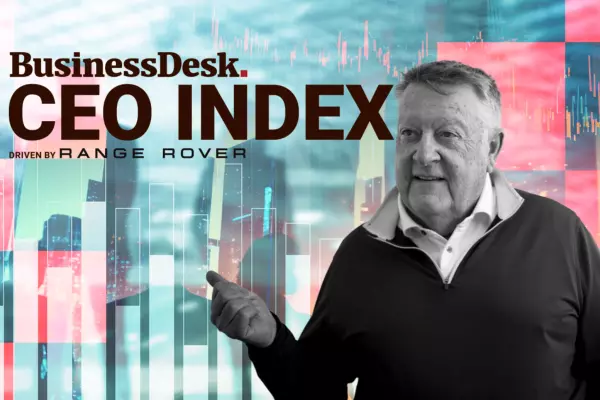The New Zealand Customs Service produces some of the most interesting news photographs of any government agency.
Wrapped in plastic, hidden in a chessboard, lurking in a suitcase, stuffed in a hollow girder – guns, drugs, smokes – Customs always has a “gotcha” image of the contraband and narcotics it’s constantly finding at the border.
However, if you want to know about the boss of the Customs Service, Christine Stevenson, you’ll be hard pressed to find more than a couple of “grip and grins” in the news section of the agency’s website.
On its Facebook page, Stevenson – known officially as the Comptroller of Customs – occasionally appears, often in uniform, just as you’d expect of the Commissioner of Police or the head of the NZ Defence Force.
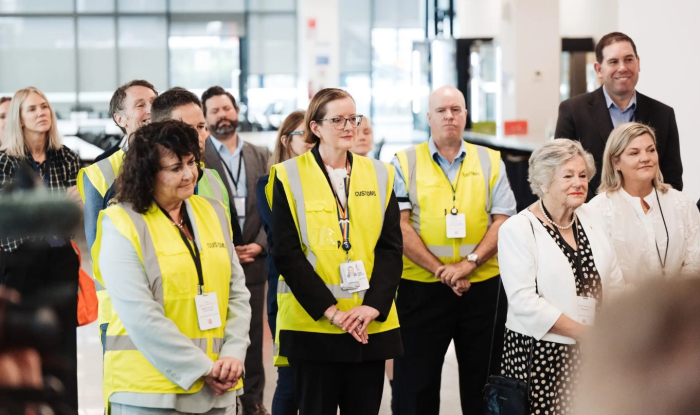
Christine Stevenson (centre) on a site visit with Customs Minister Casey Costello (left).
The almost-invisible face of Customs is one of the most admired civil servants in NZ, but had to be persuaded, not quite at gunpoint, to talk to BusinessDesk to mark her being shortlisted and ultimately winning the public sector category of the inaugural CEO Index.
“She is widely acknowledged as being in the top cohort of leadership in customs globally,” says Air New Zealand chair Dame Therese Walsh, who was one of our judges. “As the head of NZ Customs for the last five years, Christine has proven incredibly competent and effective, providing strong leadership during covid, overseeing the completion of multiple international arrangements, and reporting strong operational performance.”
Pandemic challenge
Exporters recognise Customs under Stevenson's leadership for making their lives easier, embracing technology to simplify processes and reduce compliance, says Walsh.
During the pandemic, Stevenson was one of the busiest people in the land. She had only been in the job slightly over a year, having moved from Corrections, where she had been deputy chief executive.
Looking back, Stevenson spells out the extent of the challenge she and her state sector organisation faced: “The impact on Customs was immense, from the initial border closure, through the testing and mandatory vaccination of uniformed staff, the setup of the new maritime Border Order, which necessitated recruiting and training 350 new temporary officers to monitor international seafarers on ports, and then eventually working on reopening the border.”
“She did a terrific job,” says recently departed Air New Zealand chief executive Greg Foran, who gives Stevenson 10/10 – “one point for talking, nine points for doing”.
Public service mentors
You could argue that covid was an extreme exercise in change management, and Stevenson had had some excellent training in that from senior public service mentors.
These included her former boss at the Ministry of Social Development, Peter Hughes, when he was the chief executive there and she was one of his deputies, and Ministry for Primary Industries (MPI) director-general Ray Smith, with whom she worked at Corrections.
“Peter was very focused on how we treated New Zealanders who were entitled to our services," she says. "He expected us to show empathy and compassion, but also to give people in the welfare system active and practical assistance. He insisted that public servants owned mistakes, apologised, and fixed them.”
From Smith, for whom she was deputy for six years at Corrections, she says: “I learned about the importance of remaining positive while leading through adverse events, of setting a clear and inspirational direction in which staff can see themselves and their work, and of bringing together the power of a diverse team to achieve performance greater than the sum of the parts.”
Integrity and determination
Stevenson continues to work closely with Smith, who is himself shortlisted in the inaugural BusinessDesk CEO Index in the public sector.
“Christine is a great public servant, very attentive to the needs of ministers and governments, and leads with a high degree of integrity and determination to get things done,” says Smith.
She is visible among her people and has instilled a pride in their profession, he adds: “With Christine at Customs and me at MPI, we’ve used our close relationship to build a much better experience for travellers across the border.”
The comptroller part of her role at NZ Customs holds serious responsibility – NZ Customs collected $17.4 billion in revenues for the Crown last year, which represents 10.4% of total government income. And the senior public servant has not stood still since the borders opened again – one of her biggest challenges to fight is a sustained increase in large-scale drug smuggling and unrelenting activity from transnational organised crime groups.
Stevenson established a greater NZ Customs presence at marine ports in 2023, improving its ability to detect and seize illicit goods and to disrupt and dismantle organised crime groups.
'It almost killed her'
The NZ Customs chief executive was one of the few NZ officials in the room during the recent visit to Wellington of Kash Patel, the head of the US Federal Bureau of Investigation.
Stevenson is also credited with being instrumental in digitising border travel, delivering the app instead of the paper form for NZ Customs.
As one senior commentator who works with the public sector put it: "Everybody just talks about shit. She's done the app. It almost killed her, but she would never boast about it."
BusinessDesk's panel of independent judges said: “She is widely known and upheld as providing phenomenal leadership. She is held in high regard and is pragmatic but curious.”
BusinessDesk asked Stevenson about her approach to some of the key criteria assessed by the judges: innovation, resilience, and influence (she didn’t address impact and vision):
Innovation: “The New Zealand Customs Service was already an innovative organisation when I came to work here,” says Stevenson.
The best thing she could do was to continue to encourage that, to take an active and personal interest in the ideas her teams had, and to support them by removing barriers where she could, by helping to find funding, she says.
She also wanted to ensure that some of the more “boring but necessary” things were in place – appropriate procurement, good governance, risk management, and probity – so that the innovative ideas could be turned into action and successful delivery.
Stevenson says she sees plenty of ideas for innovation from her links to counterparts overseas.
“We have a lot of engagement with Customs administrations around the world, and so we have regular opportunities to see and learn from the best in our sector.”
“We also have to deal with criminal groups which are determined, wealthy, and technologically capable. That is a real incentive to Customs people to come up with innovative ways to thwart criminal activities,” she says.
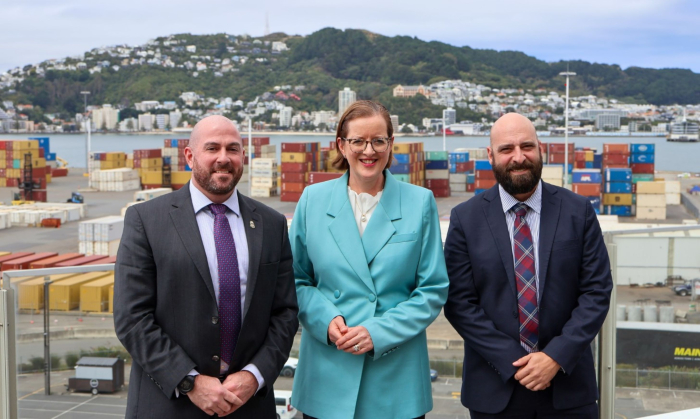
Stevenson with US Customs and Border Protection executives Robert Renner and Patrick Hosey, who visited NZ in February to outline America's fight against fentanyl and other synthetic opioids and to discuss key trends in transnational and organised crime.
Influence: A public service chief executive for whom Stevenson worked early in her career told her that they were in a monopoly business.
“In his view, in the public service, without competitors, organisations would only perform as well as [their] leaders are prepared to demand and push for,” she says.
In Stevenson’s view, New Zealanders should be able to expect public service agencies to provide excellent services to them.
And with that in mind, she sets demanding goals for herself and for NZ Customs. She says: “It matters very much to me that Customs does all of the many things it is responsible for delivering to a high standard, and I would hope others see that.”
She says she also cares deeply that Customs is an enjoyable, supportive, and fulfilling place to work.
Resilience: After her experience with the unprecedented covid pandemic, Stevenson says she has learned that when there is no playbook and no one has ever experienced anything like this, “you have to think very, very hard” about what needs to be done and how to respond.
“You need to try to understand the impacts and consequences from your decisions and actions,” she says. “You also need to try to carve out time to anticipate what might be required of you and your organisation in the future, even when that future is almost unknowable.”
Stevenson says she learned that to succeed, she had to surround herself with a team of her best people, and with them she could achieve “astonishing things”.
“They may not always be the most senior, but you must try to ensure that you have people with skills, deep experience of your organisation and what it does, a positive and flexible attitude and work ethic, who can work constructively with others, and who can cope with almost constant uncertainty and ambiguity.”
As their leader, she has learned that her most important, perhaps sole job, was to support and encourage people to do what they do best.
“To show them your optimism and confidence that they will find a way to successfully design and implement solutions, and that there will be a brighter future,” she says.
And she was reminded that it was almost impossible to communicate with her teams too much.
“When they start quoting you back at you, you’ve probably got there,” she says.
A good book: Hamnet by Maggie O’Farrell. Says Stevenson: “It’s wonderfully written, traversing the deepest grief and love, against a backdrop of domestic life in the late 1500s, brought vividly, and almost viscerally, to life”
Sliding doors: “From being very reluctant to take on a CE role, I feel so fortunate to be doing something that I thoroughly enjoy,” says the Customs chief executive.
She’d be interested in doing a job swap, though, and says working in an independent bookshop like Unity Books in Wellington would fit the bill.
● BusinessDesk will publish a report on the overall winner of the CEO Index on Nov 19.
● All images: NZ Customs.
● Read more of the BusinessDesk CEO Index here.


